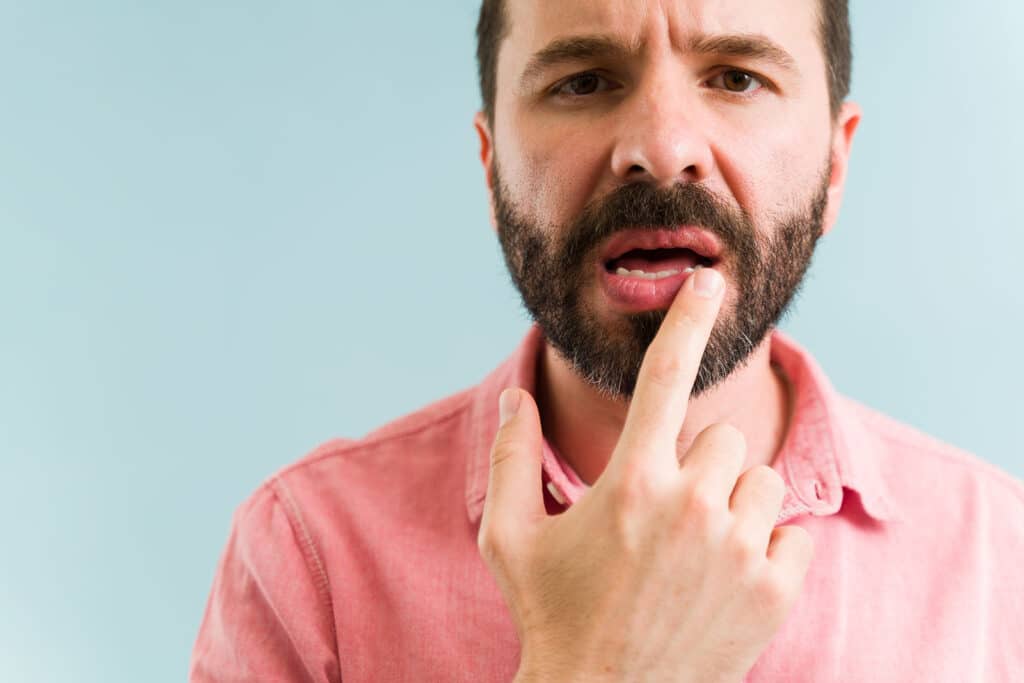If you know someone who’s depressed, please resolve to never ask why. Depression isn’t a straightforward response to a bad situation; depression just is, like the weather — Stephen Fry
Mental illness is no joke. It can strike at any time, even if you have every reason to be happy. Once you realize that you have a mental issue, you’d seek help from a doctor or a therapist.
Cymbalta is a name that you may hear then. It’s a drug to help people overcome their depressive or anxious states.
In this post, we’ll show you everything you need to know about Cymbalta, as well as the side effects, dangers, and doses.

Table of Contents
Cymbalta: An Overview
Cymbalta, also known as Duloxetine, is a medicine used to treat various nerve-related and depressive conditions.
These conditions include but aren’t limited to:
- Neuropathic pain
- Fibromyalgia
- Generalized anxiety disorder
- Depressive disorders
Cymbalta is a part of a drug family known as SSNRIs (serotonin-norepinephrine reuptake inhibitors). It acts by restoring the balance of neurotransmitters in the brain.
In simpler words, Cymbalta is used to treat depression and anxiety, along with the associated nerve-related pain.
Any medication that tackles mental illness will need appropriate dosages and continuous checkups with your doctor. Improper dosages or sudden omission of the drug will lead to withdrawal effects.
Additionally, the drug has side effects that may or may not be tolerable. Let’s break everything down bit by bit.
Is Cymbalta Dangerous?
Cymbalta won’t have a directly dangerous effect on the body. However, it can induce some suicidal thoughts in some people. These thoughts are more marked in patients who are 24 or younger.
Much like many antidepressants, Cymbalta comes with a boxed warning, arguably the most serious warning issued by the FDA (Food and Drug Administration).
If you or anyone you know is getting more suicidal thoughts after taking Cymbalta, reach out to your doctor immediately so you can stop and change the drug.
If we put these rare suicidal thoughts aside, Cymbalta’s side effects aren’t life-threatening or dangerous. We’ll discuss those right after we talk about the doses.
Cymbalta’s Dosage
Before mentioning any doses, it’s essential to understand that you mustn’t take Cymbalta without consulting a doctor. The doses we’re about to show you are the average doses that most doctors give.
However, these doses can and will change depending on the patient’s condition. So, even if the doctor has already prescribed a dose, you should never alter that dose on your own.
Cymbalta’s starting dose is 30 mg. The doctor may then increase the dose increments by 30 mg. In other words, the dose could be 30, 60, 90, or 120 mg in extreme cases.
Your doctor will instruct you to take an oral capsule once or twice a day. You should take the capsule as a whole. Don’t crush it or break it down.
What Are the Side Effects of Cymbalta?
Taking Cymbalta can improve your mood, energy, and overall self-confidence. It also reduces nerve pain resulting from conditions like diabetes and peripheral neuropathy.
Cymbalta has common side effects that most patients experience. It also has other rare ones. We’ll discuss both.
Common Side Effects
1. Dry Mouth
Cymbalta can reduce the amount of saliva that your mouth produces. Less saliva may be enough to cause a dry mouth.

Saliva also reduces the mouth’s smell to some extent. That’s why a patient taking Cymbalta may experience an unpleasant mouth odor.
Fortunately, you can easily overcome this side effect by frequently drinking sips of water.
2. Nausea
The condition of having an uneasy stomach is known as nausea. When the stomach is upset for extended periods, it may lead to vomiting.
Nausea is one of the more common side effects of all antidepressants. Luckily, most people start building up tolerance against it and may not feel it after a while.
3. Loss of Appetite
As we mentioned earlier, Cymbalta adjusts the chemistry of the brain’s neurotransmissions. Unfortunately, the process isn’t always smooth and may mess up the chemistry of other body parts.
Loss of appetite often results from such messed-up chemistry. The patient who doesn’t eat well may experience some weight loss.
The drug itself doesn’t cause weight loss, but the lack of food does. That’s why you should force yourself to eat well even if you don’t feel like it.
4. Profound Sweating
Cymbalta isn’t the only drug that causes sweating. Most antidepressants have sweating as their side effect, and it’s nothing to worry about.
You can overcome the unpleasant sweating odor by cleaning the sweaty areas or using deodorant.
5. Generalized Fatigue
Antidepressants are known to cause various degrees of fatigue. Fatigue usually happens because of muscle weakness caused by the drug.
This muscle weakness can be more prominent if you’re not ingesting enough food. Good nutrition will be your best bet to fight against both fatigue and weight loss.
6. Skin Rash
Cymbalta might cause a skin rash on higher doses. It’s essential to avoid scratching your skin, even if it feels a bit itchy.
Rare Side Effects
1. Sexual Dysfunction
Messing up the chemistry of the body paired with nausea and fatigue may end up causing sexual dysfunction. The condition may vary from a minor inconvenience to a marked inability to function sexually.
It’s best to consult your doctor when that happens so they can adjust the dose.
2. Liver Damage
Liver damage with Cymbalta happens when large amounts of alcohol are present in the bloodstream. The drug itself gets metabolized by liver enzymes.
Adding alcohol to the mix will risk your liver’s health. Patients with liver failure shouldn’t use Cymbalta.
3. Colitis
Colitis is the upset of the digestive tract. It happens because of infections but can occur due to some drugs like Cymbalta.
It’s best to report colitis to your doctor so they can adjust the dose or change the drug if needed.
Is Cymbalta Addictive?
Most antidepressants, including Cymbalta, aren’t addictive. However, the drug can still cause some sort of physical dependence on withdrawal.
Without getting too sciency, physical dependence is when your body depends on a certain drug to a large extent. We can say that addiction is the ‘next stage’ of physical dependence.
Cymbalta’s Withdrawal
Abruptly stopping antidepressants is dangerous. With coordination with your doctor, you should utilize a medical taper. This expression means gradually reducing your medication to reduce the severity of the withdrawal effects as much as possible.
The withdrawal period will vary depending on how long you have been using the drug. Your maximum dose will also have an effect. For example, withdrawing from a 90 mg/day dose will take a bit longer than withdrawing from a 30 mg/day dose.
Patients who withdraw from Cymbalta will experience some signs. These signs include:
- Too much or too little sleep
- Constant headache
- Muscle tension
- Irritability and nervousness
- Anxiety
Inform your friends and family when you’re withdrawing from Cymbalta. The extra care can go a long way in helping you through the withdrawal effects.

What Are the Long-Term Effects of Cymbalta?
You may have heard a friend or a colleague saying: Cymbalta ruined my life. While Cymbalta can improve your life to a considerable extent, misuse or prolonged intake can turn things upside down.
Doctors are well aware of Cymbalta’s ability to cause physical dependency. That’s why they often alter the dose or change the drug entirely after a while.
However, some people get mentally addicted to how Cymbalta makes them feel. They’d then start disregarding the doctor’s instructions and start taking Cymbalta just for the emotional state it puts them in.
That’s when the thin line between physical dependency and addiction starts to fade. At that point, patients would no longer seek the drug to improve their condition; they would seek it to be in the comfortable state the drug provides.
That’s when Cymbalta can ruin someone’s life. Fortunately, as long as you’re taking it while consulting a doctor, none of this would happen.
How to Sleep While Taking Cymbalta?
Cymbalta’s side effects may make it more challenging to sleep; which may affect your quality of life.
That’s why many OTC sleeping aids are available for purchase without a prescription. However, you should still consult your doctor on the safety of those drugs.
Melatonin is a safe sleeping aid that you can take with Cymbalta, especially for ages 55 and above.
When to See a Doctor?
There are some red flags you might experience while withdrawing from Cymbalta. If you experience any of those conditions, you should immediately reach out to your doctor.
Here are the signs to look out for:
- Severe dizziness
- Panic attacks
- Trouble breathing
- Seizures
- Constant suicidal thoughts
Get Help for Yourself or a Loved One
It’s not a shame to have a mental disorder. Mental diseases can sometimes be more severe than physical ones.
If you or anyone you care about is experiencing anxiety or depression, then don’t hesitate to reach out for help.
Our live chat services are available 24/7, and you can call us at any time.
FAQ
How to sleep while taking cymbalta?
What is the best time of day to take cymbalta?
Does Cymbalta affect you sexually?



